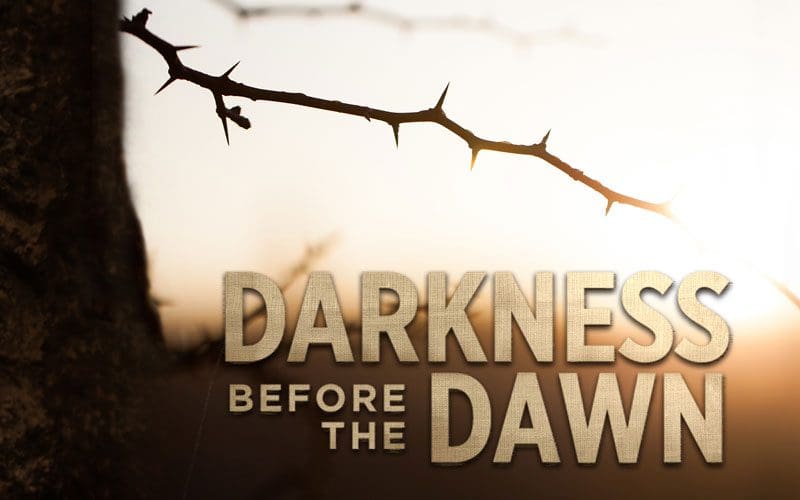“The gospel of God… regarding His Son, who as to his human nature was a descendent of David…” Romans 1:3 (NIV)
Why is this here? Paul says, “Jesus Christ is God’s Son, He is our Lord, He is risen from the dead.” Why does he add, “as to his human nature he was a descendent of David?’
The great preacher, John Chrysostom, commented in the 4th century:
“Why do you, O Paul, after… lifting up our souls …and speaking of the Gospel of God, and bringing in the chorus of the prophets… Why do you bring us down to David?” [1]
The answer to his question is—the Savior who is Lord is good news because he belongs to us.
The Good News of God’s Son
When you hear that Jesus is God’s Son, that he rose from the dead, and that he is Lord, maybe you find yourself asking, “What does all this have to do with me? What difference does this make to my life?” I want you to see today that the good news of God’s Son is for you.
God has always existed in three persons…
…the Father, the Son, and the Holy Spirit
Genesis 1 tells us:
“In the beginning God created the heavens and the earth…” (1:1)
“The Spirit of God was hovering over the waters…” (1:2)
“And God said…” (1:3)
“Let us make man in our image…” (1:26)
This is a marvelous truth for many reasons. One reason it is such a wonderful truth is that before anything else existed, love flowed between the Father, the Son and the Holy Spirit.
The universe was created out of an overflow of this love. If life evolved by random chance, on the basis of the survival of the fittest, then love can be nothing other than enlightened self interest. To say, “I love you,” could only mean, “I need you,” or, “I want something from you.”
I’m so glad that the world, and everything in it, has been created by God, out of the love that overflows between the Father, the Son and the Holy Spirit and that we have been made in the image of God.
The Son became a man
God has always existed in three persons—the Father, the Son and the Holy Spirit. At one point in human history, now more than 2000 years ago, the second person of the Trinity did something completely new. Something happened to him. God the Son became a man.
The Bible describes this in different ways:
“Christ Jesus, who being in very nature God… made himself nothing, taking the very nature of a servant…” (Philippians 2:5-7)
“The Word became flesh and made his dwelling among us.” (John 1:14)
“Though he was rich, yet for your sakes He became poor…” (2 Corinthians 8:9)
God the Father was involved in this as much as God the Son. The Father gave the Son:
“God so loved the world that he gave his one and only Son…” (John 3:16)
The Father sent the Son:
“When the time had fully come, God sent his Son, born of a woman…” (Galatians 4:4)
The Holy Spirit was involved as much as the Father.
“The angel answered [Mary], ‘The Holy Spirit will come upon you, and the power of the Most High will overshadow you. So the holy one to be born will be called the Son of God.’” (Luke 1:35)
The eternal Word of God took human flesh and was born of the virgin, Mary. The Son of God became a man. He left heaven. He came. He was born. And He did this for us.
Grasping the Humanity of the Son of God
Think about the human nature of the Son of God. He is God and he is man. Paul says, “as to his human nature,” he descended from David. You may think this is a truth you know well. But how well have you grasped it? Here’s a test: Do you pray? And when you pray, do you believe the Lord Jesus Christ knows what your life is like? Does he get it? Does he know where you’re coming from? When you are tempted, do you feel you could come to Jesus and say, “You know what this is like.” When you are afraid, do you feel you could say to Jesus, “You’ve been here too.”
When we face trouble, we turn away from people who don’t know what it is like. We turn to those who have been there. The great test of whether you have really understood the humanity of Christ is whether you turn to Jesus when you face difficulty. Do you see him as someone who understands what you are going through and knows what it is like?
“We do not have a high priest who is unable to sympathize with our weaknesses, but we have one who has been tempted in every way, just as we are–yet was without sin. Let us then approach the throne of grace with confidence, so that we may receive mercy and find grace to help us in our time of need.” Hebrews 4:15-16
When you grasp the humanity of the Son of God, you will come to him and you will receive help from him.
1. Jesus had a human body
I’ve been helped this week by reading Professor Donald Macleod. He has a gift for fresh language and so I will be quoting him several times…
“God’s Son took a human body which had the same biochemical composition as our own, exactly the same anatomy and physiology, the same central nervous system and the same sensitivity to pain.” [2]
The first serious heresy to arise in the early church was not to deny that Jesus is God, but to deny that Jesus is a man. The heresy was called “docetism.” This comes from a Greek word which means “to seem.”
The docetists found the idea of the Son of God with a human body quite repulsive. How could God stoop so low to get bound up with something as earthy and embarrassing as a human body? Think about it—toe nails that need clipping, a nose that needs blowing, and hair that gets out of control.
The idea that God would get caught up with all that was just too gross to contemplate. So, the docetists said Jesus did not have a body like us, He just appeared to be like us. The Apostle John wrote about them: “This is how you can recognize the Spirit of God: Every spirit that acknowledges that Jesus Christ has come in the flesh is from God, but every spirit that does not acknowledge Jesus is not from God” (1 John 4:3).
The humanity of Jesus mattered to the apostles and it should matter to us. Christ came in the flesh. Jesus had a human body, like yours and mine. It was physical, touchable, woundable flesh and blood. Human nature involves more than a body. For Christ to take human nature to himself means that…
2. Jesus had a human soul
The soul involves thinking, feeling, and relationship.
Luke tells us that “Jesus grew in wisdom…” (Luke 2:52). Children, listen up! When you memorize verses in the Bible, remember the Lord Jesus learned his Bible exactly the same way you do. When you take notes, or when you kneel down to pray, the Lord Jesus did these things the very same way you do. There were no shortcuts for him.
Jesus formed friendships, just as we do. He had places where he was able to relax and be at home—the house of Mary, Martha and Lazarus (John 12:1-3). Jesus was drawn to certain people. When he chose the disciples, the first reason given is that they would be with him (Mark 3:14). When children came to him, he connected with them, took them up in his arms and blessed them (Matthew 18:13-15).
Jesus experienced the full gamut of emotions. The Scriptures tell us that he was troubled (Mark 14:33), in anguish (Luke 22:44), deeply distressed (Mark 14:33), and overwhelmed with sorrow (Mark 14:34).
Christ knows more about your life from his own experience than any pastor, any counselor, or any friend. He knows more about your life than his mother Mary. Why has Mary become important in the prayers of many people? Because many feel that Christ is far from them, and they are looking for someone who is near. But the wonderful truth of the human nature of the Son of God is that Jesus Christ has come near to you.
3. Jesus knows human life
Here are ten examples of how Jesus connects with our lives.
1. Have you ever felt exhausted?
Jesus has been there. He fell asleep in a boat (Mark 4:38). When the demands on you are great—you can come to him—he knows. When you feel you need some space and you need to get alone, Jesus has been there. Surrounded by crowds, he needed to withdraw and to rest for a while (Mark 6:31).
2. Do you have loved ones who are deeply resistant to Christ?
Jesus has been there. His own brothers said he was out of his mind (Mark 3:21).
3. Do you work in an ungodly environment?
Jesus has been there. Macleod says:
“He came into first century Nazareth… He lived where He could see human sin, hear human swearing and blasphemy, see human diseases, and observe human mortality, poverty and squalor.” [3]
4. Do you live with the tension of disloyalty on your team?
Judas was one of the twelve, but he was not with Jesus. Macleod says:
“He knew the full horror of human infidelity and treachery” [4]
5. Have you felt moved by the plight of people living without hope?
Jesus has been there. He saw crowds of people who were like sheep without a shepherd and he had compassion on them (Matthew 9:36).
6. Have you felt angry about injustice and abuse in this world?
Jesus would say to you “Me too.” He was filled with anger over the self interest of temple rulers who had turned the one area of the temple designed by God as a place where Gentiles could seek him in prayer into a market place that made prayer almost impossible (Mark 11:15-17).
7. Have you grieved the loss of someone you love?
Jesus has been there. One day Jesus received news that one of his closest friends had died. He went to visit, and when he saw Mary weeping, he was deeply moved to the point of breaking down in tears himself. People said “You can see how much he loved Lazarus” (John 11).
8. Do you feel your future is so dark you can hardly bear to think about it?
Jesus has been there. When he came to the Garden of Gethsemane, He was “overwhelmed with sorrow” (Mark 14:34).
9. Have you suffered unjustly at the hands of others?
Jesus has been there. Read the story of Holy week (Matthew 21-28; Mark 11-16; Luke 19-24; John 12-21).
10. Have you ever felt without hope, without help, without comfort, without God?
Jesus has been there: He was nailed to the cross. He was loaded with the guilt of the world. The land was plunged into darkness. At the moment he needed it most, all sense of the peace, presence and blessing of God was taken from him. The love and approval of his Father that he had known and enjoyed was gone. And he cried out in a loud voice, “My God, my God, why have You forsaken me?” (Mark 15:33-34)
Macleod says:
“Needing God as no man ever needed God, He cried and God was not there… We never go beyond His pain. Our darkness is never more intense than His.” [5]
Don’t ever say, “God doesn’t understand!” When you see the humanity of Jesus, it won’t be long before you find yourself saying, “This Savior has something for me after all. He knows my life. he knows me!”
The Purpose of the Incarnation
“The gospel of God… regarding his Son, who as to his human nature was a descendent of David…” Romans 1:3
The Son of God became a man. Jesus had a human body, a human soul and He experienced human life. Why did He live in this world? What was his purpose? What was all this for? When we’re in trouble, we need to know more than, someone else has been in the same mess that we’re in. The title “Son of David,” points to the reason why Jesus Christ came into the world. Most people know two stories about David:
David and Goliath
One is the story of David the great champion who overcame Goliath. God’s people were oppressed by their enemies. Goliath taunted them. No one was able to go out and fight him. There they were, an army living in defeat and in shame. Then David came to the field of battle. He took stones from the river and killed Goliath. Through the triumph of this one man, all of God’s people entered into a marvelous victory.
The Son of God took our nature to be our champion
Here we are facing our enemies—sin, death and hell. No man has overcome sin. No man can overcome death. All men are deserving of hell. So the Son of God becomes a man. He takes our human nature so that he can be our champion. God becomes a man and He goes out to face our enemies. Now there is a man without sin, a man who triumphs over death. Now there is a man in heaven. And all of his people will enter into his marvelous victory.
David and Bathsheba
The second story most people know about David is the story about David and Bathsheba. David took another man’s wife. Bathsheba was the wife of Uriah who was a captain in David’s army. Uriah was ready to lay down his life for David, and David put him in the front of the battle to make sure that he died.
Follow the story and you find that David had a divided family. It was an agonizing story of human weakness, human sin, human failure, and human pain. God’s people were looking for someone greater than David who could deal with the human sin and failure that stains our souls, and steals our joy and forfeits the blessing of God.
The Son of God took our nature to deal with our failure
Christ took our human nature to deal with our sin. Because He had no sin of His own, He was able to lay down that perfect life as a sacrifice for the sin of others:
“For this reason he had to be made like his brothers in every way, in order that he might become a merciful and faithful high priest in service to God (ie., that he may act on our behalf), and that he might make atonement for the sins of the people.” Hebrews 2:17
He comes to us to stand with us and to act for us. Only as a man could he win our battle. Only as a man could he bear our sin. The Son of God became Son of Man so that the sons of men could become sons of God. Thank God that “as to his human nature [he] was descended from David.”
“We do not have a high priest who is unable to sympathize with our weaknesses, but we have one who has been tempted in every way, just as we are–yet was without sin. Let us then approach the throne of grace with confidence, so that we may receive mercy and find grace to help us in our time of need.” Hebrews 4:15-16
You can come to him to receive mercy and to find grace to help us in our time of need. When you grasp his humanity, and you know that he is your champion and your redeemer, you will come to him.
[1] Paraphrased from John Chrysostom, “Homilies on Romans,” Homily 1—Romans 1:1-2
https://www.ccel.org/ccel/schaff/npnf111.vii.iii.html
[2] Donald Macleod, “A Faith to Live By,” p.118
[3] Ibid, p. 122
[4] Ibid, p. 122
[5] Ibid, p. 123





